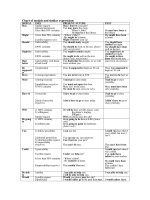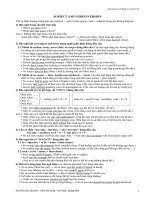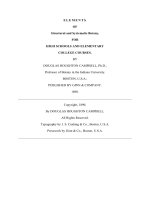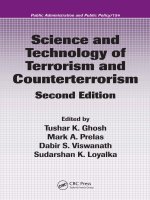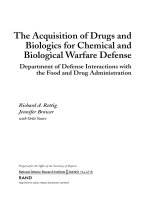CHART OF MODAL AND SIMILAR EXPRESSION(WITH EXCISES)
Bạn đang xem bản rút gọn của tài liệu. Xem và tải ngay bản đầy đủ của tài liệu tại đây (92.94 KB, 3 trang )
Chart of modals and similar expressions
MODAL USES PRESENT/ FUTURE PAST
May
1)polite request
2)formal permission
3)less than 50% certainty
May I borrow your pen?
You may leave the room
- Where’s John?
- He may be at the library.
He may have been at
the library.
Might
1) less than 50% certainty
2) polite request (rare)
- Where’s Mary?
-She might be at home.
Might I borrow your car
She might have been
at home.
Should
1)advisability
2)90% certainty
You should study tonight.
She should do well on the test. (future
only, not present)
You should have
studied last night.
She should have done
well on the test.
Ought to
1)advisability
2)90% certainty
You ought to study tonight.
She ought to do well on the test.
(future only, not present)
You ought have to
studied last night.
She ought to have
done well on the test.
Had
better
1)advisability with threat
of bad result
You had better be on time, or we will
leave without you
(past form uncommon)
Be
supposed
to
1)expectation
Class is supposed to begin at 10 a.m Class was supposed to
begin at 10 a.m
Be to
1) strong expectation
You are to be here at 9.00 You were to be here at
9.00
Must
1)strong necessity
2)prohibition (negative)
3) 95% certainty
I must go to class today
You must not open that door.
Mary isn’t in the class.
She must be sick. (present only)
I had to go to class
yesterday.
Mary must have been
sick yesterday.
Have to
1) necessity
2)lack of necessity
(negative)
I have to go to class today
I don t have to go’ to class today.
I had to go to class
yesterday.
I didn t have to’ go to
class yesterday.
Will
1) 100% certainty
2) willingness
3)polite request
He will be here at 6.00. (future only)
- the phone’s ringing.
- I ll get’ it.
Will you please pass the salt?
Be going
to
1) 100% certainty
2) definite plan
He is going to be here at 6.00. (future
only)
He is going to paint his bedroom.
(future only)
Can
1) ability/ possibility
2)informal permission
3) informal polite request.
4) impossibility
(negative)
I can run fast
You can use my car tomorrow.
Can I borrow your pen?
That can t be’ true.
I could run fast when I
was a child, but now I
can’t.
That can t have been’
true.
Could
1) past ability
I could run fast when I
2) polite request
4) less than 50% certainty
5)impossibility(negative)
Could you help me?
- Where’s John?
- He could be at home.
That couldn t be’ true!
was a child.
You could have
talked to your teacher.
He could have been
at home.
That couldn’t have
been true!
Be able
to
1)ability
I am able to help you.
I will be able to help you.
I was able to help you.
Would
1) polite request
2)preference
Would you please pass the salt?
I would rather go to the park than stay
home.
I would rather have
gone to the park than
stay home.
Used to
1) repeated action in the
past
I used to visit my
grandparents every
weekend.
Shall
1) polite question to make
a suggestion.
2) future with I or we as
subject.
Shall I open the door?
I shall arrive at nine. (will is more
common).
Exercises
1.He …….leave early, didn’t he? (must/ had to/ has to/ ought to)
2. his eyes were so bad that he ………..read the number on the board. (shouldn’t/hadn’t to/
couldn’t/ can’t)
3. there’s the waiter. I ……..ask him for the bill. (will/ shall/ am able to/ could)
4. ………….open the door for you? (Would you like that I / Do you want that I /will I /
shall)
5. ………..you be able to come to the meeting? – I’m afraid not. (Can/ will/ May/ should)
6. My car broke down so I ………..come by bus. (had to/ must/should/ could)
7. …………….ask you some questions? – OK,go ahead.(shall I / will I / should I /may I )
8. I ………….play tennis than golf. (like better to/ prefer/ ‘d rather/ ‘d better)
9. there are a lot of mistakes in this exercises. I …….. go over it again with you. (will have
to/ am able to/ would/ could)
10. he was a good swimmer, so he ………. Swim to the river bank when the boat sank.
(could/ can/ would/ was able to)
11. he ……….. live in the country than in the city.(would rather/ had better/ should/ might)
12. you ……….. go now. It’s getting late.(had rather/ had better/ ought/ would rather)
13. You ………..fly to London this evening provided you don’t mind changing planes in
Paris.(must/ have to/ can/ ought to)
14. I ……….. to take advantage of this opportunity to thank for your co-operation. (would
like/can/ am able to/ might)
15. you …………..add it up. I’m not good at figures.(a.have to/b. ought to/c. ‘d better/ both
b and c)
16. the phone has been ring ing for a minute. Noone …………at home(must have been/
can have been/ should have been/ none of these)
17. she’s fainted. Throw some water on her face and she ………. Come round.(has to/
may/ must/ can have)
18. ………..you please refrain from smoking while the lecture is in progress? (May/ Might/
Would/ Should)
19. I ……………… persuade him as I said.(wasn’t able to/ can’t/ mustn’t/ ought not)
20. I’m sorry to bother you while you’re working, but I …………ask you a question.(can/
had to/ must/ may)
21. He couldn’t have mean it seriously. He ……….laughed at you. (would/ couldn’t/ had/
must have)
22. we …….ensure the telegram arrives in time. (had to/ must/ ‘d rather/ might)
23. he ……..keep his family because his wages were too low. (couldn’t/mustn’t/ can’t/
didn’t have to)
24. the sea was too rough that we …………swim. (couldn’t/can’t/won’t/wouldn’t)
25. …………make an appointment to see the doctor? (May I / Could I / Will I/ Shall I )
26. Perhaps there ………. A good pro gram on the radio. (might be/ will be/ can be/ should
be)
27. I ……go swimming when I was young. (a. could/b.would./ c. used to/d. both b and c)
28. ………..take this letter to the post office, please?(May you/ Must you/ Would you/
none of these)
29. in our family my father ………sit at the top of the table. (used to/ had to/ ought to/
must)
30 Do it as well as you ……………. (must/ will/ can/ have to)
31. I …………swim in this water: it is much too cold.(mightn’t/ mustn’t/ can’t/ don’t have
to)
32. you …………… imagine my surprise when I heard the news. (can/ ought to/ will/ all
of these)
33. you do some work instead of sitting there reading the paper. (would rather/ ought to/
won’t/ don’t have to)
34. be careful how you hold that jug; it ……….break easily.(may/ ought to/will/ might)
35. I’m not sure where to go for my holiday, but I ……..go to China. (should/ may/ have
to/ needn’t)
36. we had free tickets, so we ……….pay to get into the concert. (didn’t have to/
couldn’t/mustn’t/ shouldn’t)
37. Now I’m feeling dizzy. I …………watched video film till midnight.(shouldn’t have/
can’t have/ couldn’t/ mustn’t)
38.
Tom ……… drive . He is too tired. (would rather/ must/ needn’t to/ ought not to)
39. shall I clean the window today? – No, you ……. (mustn’t/ needn’t/ don’t have/
shouldn’t)
40. you’ve been traveling all day. You ………….a walk now. (could take/ can’t take/ can
take/ may take)


